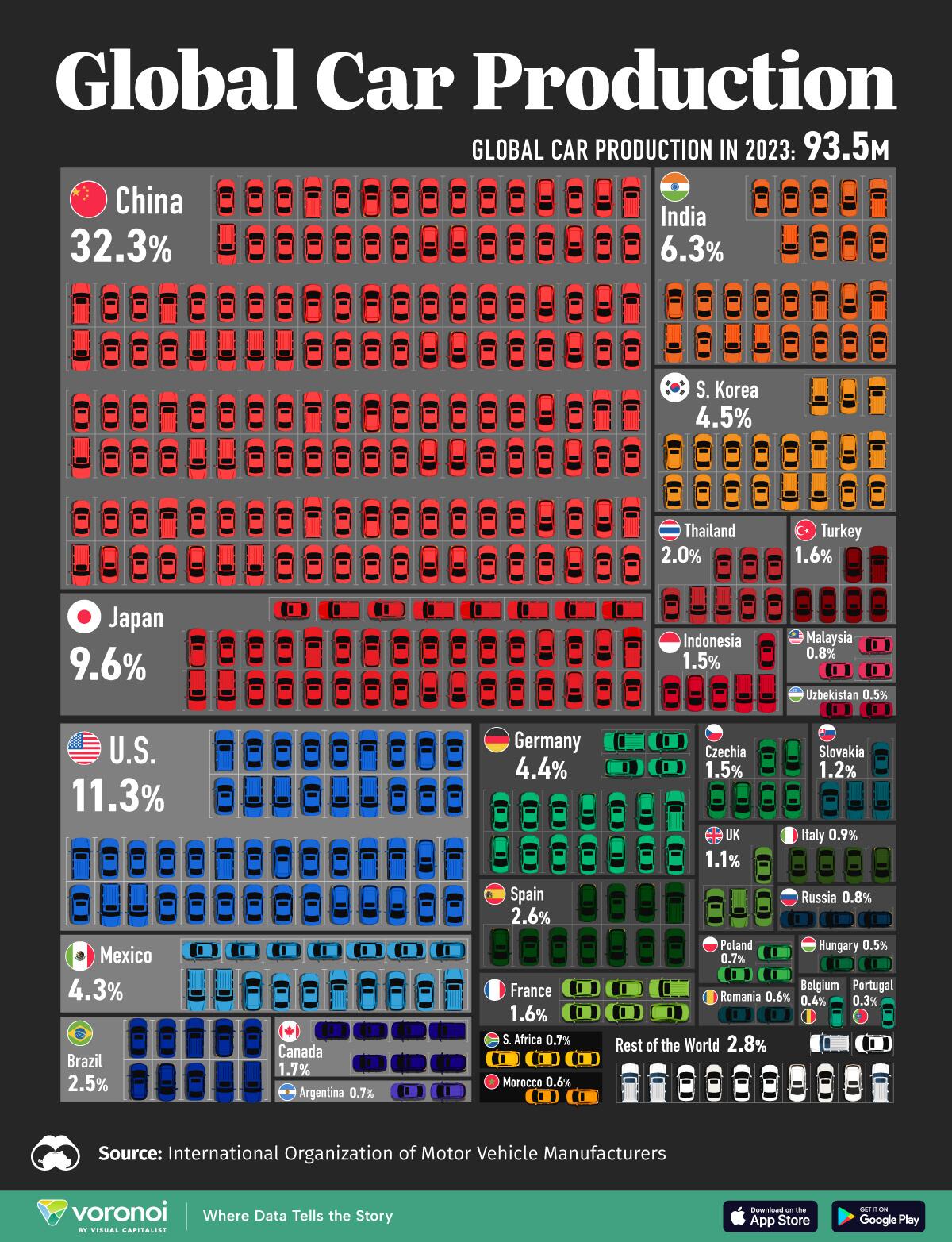This repost is being used for academic research purposes.
China Dominates As The World's Top Car Producer
Last year, global vehicle production reached 93.5 million units, representing a 2% increase compared to pre-pandemic levels in 2019 and a significant 17% rise from 2022.
This graphic, via Visual Capitalist's Kayla Zhu, visualizes the share of motor vehicles produced by the top 30 countries in 2023.
The figures come from the International Organization of Motor Vehicle Manufacturers, and includes both passenger and commercial vehicles.
Which Country Produced the Most Cars in 2023?
Below, we show the total number of motor vehicles produced by each of the top 30 countries, as well as their share of global production.
| Rank | Country/Region | Region | Total Car Production | Share of Total Production |
|---|---|---|---|---|
| 1 | 🇨🇳 China | Asia | 30,160,966 | 32.2% |
| 2 | 🇺🇸 USA | Americas | 10,611,555 | 11.3% |
| 3 | 🇯🇵 Japan | Asia | 8,997,440 | 9.6% |
| 4 | 🇮🇳 India | Asia | 5,851,507 | 6.3% |
| 5 | 🇰🇷 South Korea | Asia | 4,243,597 | 4.5% |
| 6 | 🇩🇪 Germany | Europe | 4,109,371 | 4.4% |
| 7 | 🇲🇽 Mexico | Americas | 4,002,047 | 4.3% |
| 8 | 🇪🇸 Spain | Europe | 2,451,221 | 2.6% |
| 9 | 🇧🇷 Brazil | Americas | 2,324,838 | 2.5% |
| 10 | 🇹🇭 Thailand | Asia | 1,841,663 | 2.0% |
| 11 | 🇨🇦 Canada | Americas | 1,553,026 | 1.7% |
| 12 | 🇫🇷 France | Europe | 1,505,076 | 1.6% |
| 13 | 🇹🇷 Turkey | Asia | 1,468,393 | 1.6% |
| 14 | 🇨🇿 Czech Republic | Europe | 1,404,501 | 1.5% |
| 15 | 🇮🇩 Indonesia | Asia | 1,395,717 | 1.5% |
| 16 | 🇸🇰 Slovakia | Europe | 1,080,000 | 1.2% |
| 17 | 🇬🇧 United Kingdom | Europe | 1,025,474 | 1.1% |
| 18 | 🇮🇹 Italy | Europe | 880,085 | 0.9% |
| 19 | 🇲🇾 Malaysia | Asia | 774,600 | 0.8% |
| 20 | 🇷🇺 Russia | Europe | 729,864 | 0.8% |
| 21 | 🇿🇦 South Africa | Africa | 633,337 | 0.7% |
| 22 | 🇵🇱 Poland | Europe | 612,882 | 0.7% |
| 23 | 🇦🇷 Argentina | Americas | 610,725 | 0.7% |
| 24 | 🇲🇦 Morocco | Africa | 535,825 | 0.6% |
| 25 | 🇷🇴 Romania | Europe | 513,050 | 0.5% |
| 26 | 🇭🇺 Hungary | Europe | 507,225 | 0.5% |
| 27 | 🇺🇿 Uzbekistan | Asia | 425,876 | 0.5% |
| 28 | 🇧🇪 Belgium | Europe | 332,103 | 0.4% |
| 29 | 🇵🇹 Portugal | Europe | 318,231 | 0.3% |
| 30 | 🌍 Others | - | 2,646,404 | 2.8% |
China dominated global car production in 2023, accounting for almost a third of all cars produced last year. The country currently produces and exports more cars than any other country in the world, as of December 2024.
The country currently has the capacity to produce more than twice its domestic demand for cars, freeing up a significant portion of its car production to be allocated for export.
The Chinese government has massively invested in ramping up domestic automotive production, and specifically its burgeoning electric vehicle sector.
The government’s strategic initiatives, such as “Made in China 2025,” have prioritized electric vehicle manufacturing, leading to substantial growth in this area.
The Best of the Rest
Following behind China is the United States, with 11.3% of the global share. Elon Musk’s Tesla is currently the most valuable automaker in the world, with a market cap of over $1.4 trillion, as of Dec. 24, 2024.
Tesla shares hit a record high following Trump’s victory in the 2024 presidential election. The American electric vehicle company dominates the industry, representing nearly half of the market capitalization among global automakers, with a valuation exceeding the combined worth of the next 29 car manufacturers.
Japan ranks third at 9.6% of global car production, bolstered by legacy carmakers like Toyota and Honda.
To learn more about global car production, check out this graphic that breaks down the global battery electric vehicle (BEV) industry by automaker.

